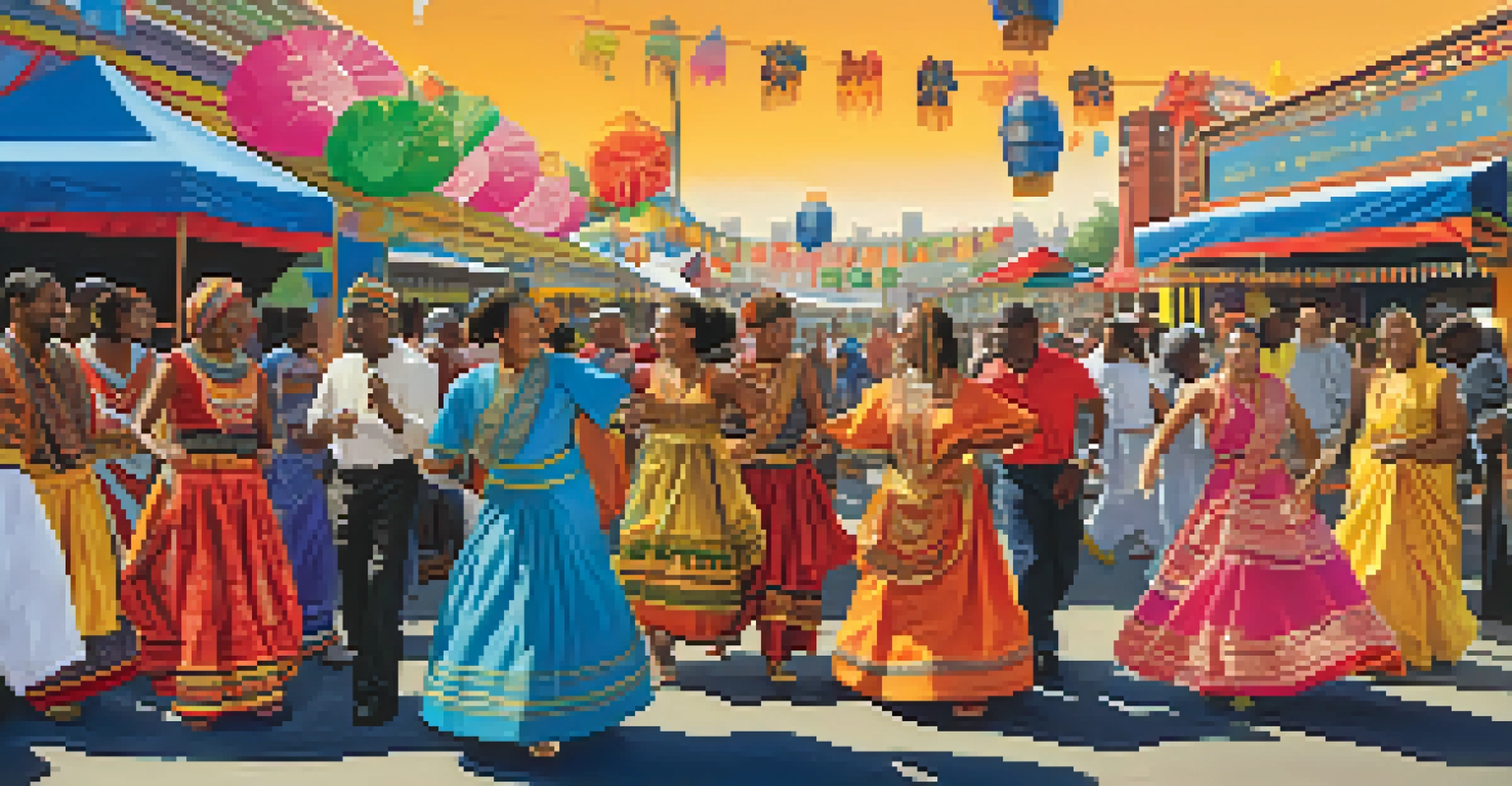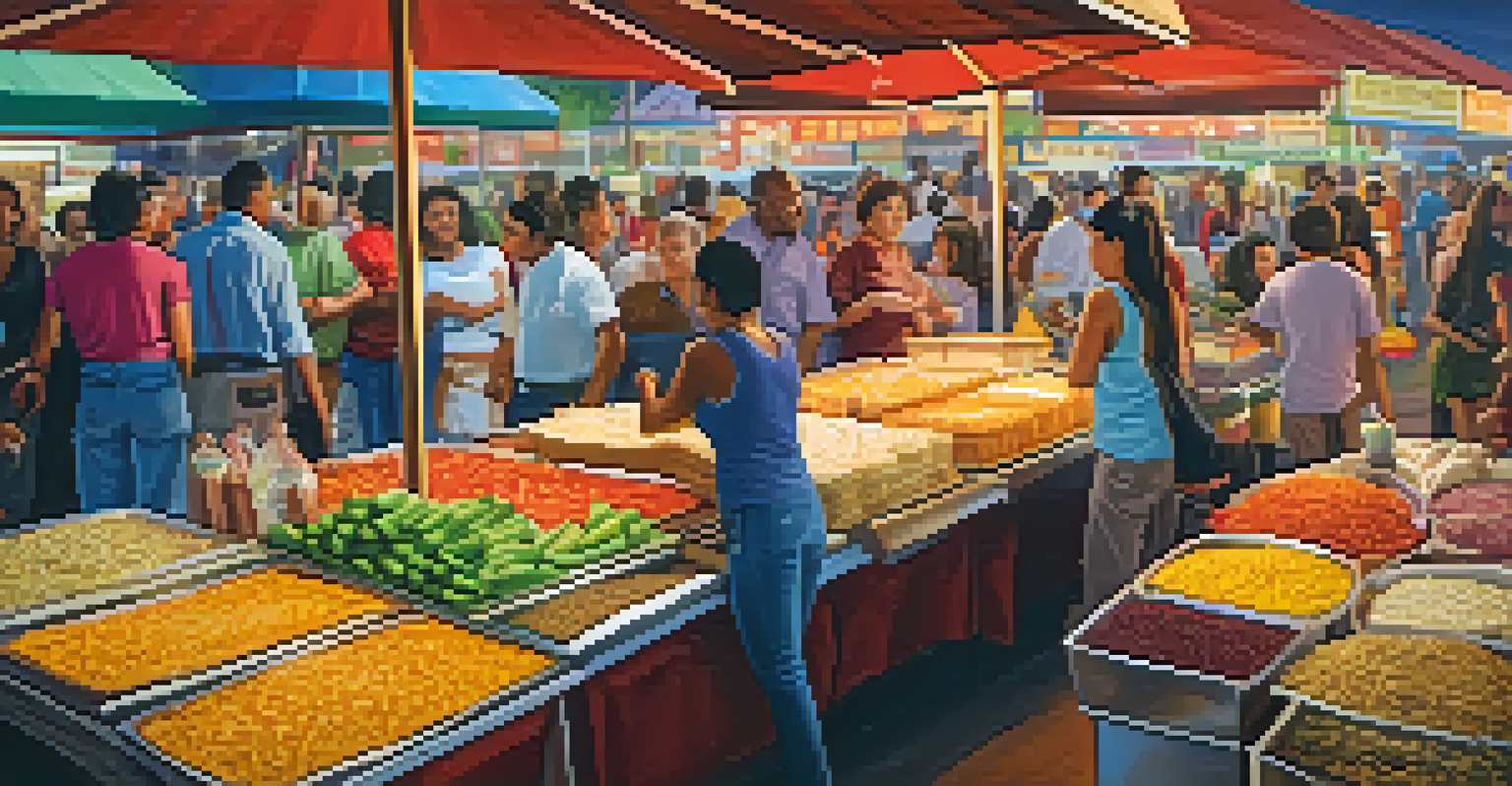History of Immigration: Cultures That Shaped Atlanta

The Early Beginnings: Native American Influence
Before European settlers arrived, the land that is now Atlanta was inhabited by Native American tribes, such as the Creek and Cherokee. These communities established trade routes and agricultural practices that laid the groundwork for future development. Their influence can still be seen today in place names and cultural practices.
Diversity is not about how we differ. Diversity is about embracing one another's uniqueness.
The arrival of settlers in the 19th century marked a significant turning point. They often interacted with Native Americans, sometimes leading to conflict or displacement. However, these early interactions also fostered a blend of cultures that influenced Atlanta's growth.
Understanding the Native American roots of Atlanta is crucial for appreciating the city’s diverse heritage. Their contributions, though often overlooked, remain an integral part of the narrative of Atlanta's development.
The Impact of European Immigration in the 19th Century
The 19th century saw a significant influx of European immigrants, particularly from countries like Ireland, Germany, and Italy. These newcomers brought with them rich traditions, languages, and culinary influences that began to shape Atlanta’s cultural landscape. For example, Irish immigrants contributed to the city’s early labor force, particularly in construction and railroads.

As these immigrant groups settled, they established their own communities and institutions, such as churches and social clubs. This not only provided them with support but also enriched the city’s cultural fabric. Festivals and events celebrating their heritage became a staple in Atlanta, fostering a sense of belonging.
Native American Roots in Atlanta
The cultural heritage of Atlanta is deeply influenced by Native American tribes like the Creek and Cherokee, whose traditions and practices laid the groundwork for the city's development.
Today, the legacies of these European immigrants are celebrated through various cultural festivals and events, reminding us of the city’s roots. Their stories add depth to Atlanta's history, showcasing the resilience and adaptability of immigrant communities.
African American Migration and Cultural Renaissance
The Great Migration in the early 20th century brought a wave of African Americans from the rural South to urban centers, including Atlanta. This movement significantly transformed the city, as migrants sought better opportunities and escape from Jim Crow laws. Their arrival helped cultivate a vibrant cultural scene, leading to the Harlem Renaissance’s influence on Atlanta.
The greatness of a community is most accurately measured by the compassionate actions of its members.
During this period, Atlanta became a hub for African American intellectuals, artists, and activists. Figures like W.E.B. Du Bois and Martin Luther King Jr. emerged from this rich cultural soil, advocating for civil rights and social justice. Their legacies continue to inspire generations and are a testament to the impact of this migration.
Today, the African American community remains a vital part of Atlanta’s identity. The city celebrates its rich heritage through museums, festivals, and cultural events that honor the contributions of those who shaped its history.
Latino Communities and Their Growing Influence
In recent decades, Atlanta has seen a significant increase in Latino immigration, particularly from countries like Mexico, Guatemala, and Colombia. This demographic shift has brought vibrant cultural expressions, including music, food, and festivals that enrich the city’s diversity. Tacos and tamales have become as common as Southern barbecue in local cuisine.
The establishment of Latino-owned businesses has also contributed to Atlanta's economy, creating jobs and fostering community development. Neighborhoods like Buford Highway have become cultural hotspots, showcasing the culinary delights and traditions of Latino cultures. These contributions have strengthened the city’s economic and social fabric.
Diverse Contributions from Immigrants
European, African American, Latino, and Asian communities have each played a significant role in shaping Atlanta's identity through their unique cultural influences and economic contributions.
As Atlanta continues to evolve, the Latino community plays a crucial role in shaping its future. Their influence not only enhances the city's cultural diversity but also fosters a sense of unity among different immigrant groups.
Asian American Contributions to Atlanta's Landscape
Asian immigration to Atlanta has a rich history, with communities from countries like China, India, Korea, and Vietnam establishing roots in the area. These groups have significantly influenced the city’s cultural landscape, introducing diverse cuisines, traditions, and festivals. Events like the Atlanta Asian Film Festival celebrate the vibrant contributions of these communities.
The growth of Asian American businesses has also transformed Atlanta’s economy. From restaurants to tech startups, these entrepreneurial efforts contribute to the city’s reputation as a thriving business hub. Local markets and cultural centers serve as gathering places, fostering connections between different cultures.
As Atlanta’s Asian American population continues to grow, their impact on the city is undeniable. Their stories of resilience and success enrich the narrative of Atlanta, showcasing the strength of diversity.
The Role of Refugees in Atlanta's Cultural Mosaic
In addition to traditional immigrant populations, Atlanta has become a haven for refugees from various parts of the world. Communities from countries like Syria, Somalia, and Afghanistan have found a new home in Atlanta. Their journeys often involve overcoming immense challenges, and their resilience adds depth to the city's narrative.
Refugees contribute to Atlanta not only through their labor but also by enriching the cultural fabric of the community. They introduce unique traditions, foods, and perspectives that enhance the city’s diversity. This blending of cultures fosters a spirit of inclusivity and mutual respect among residents.
Refugees Enrich Atlanta's Culture
Refugee populations from various countries contribute to Atlanta's cultural mosaic, introducing new traditions and fostering a spirit of inclusivity within the community.
Today, various organizations work to support refugee resettlement and integration in Atlanta. Their efforts help create a welcoming environment, ensuring that the contributions of refugees are recognized and celebrated.
The Future: Embracing Diversity in Atlanta
As Atlanta continues to grow, the importance of embracing its diverse immigrant heritage becomes increasingly clear. The city’s identity is shaped by the myriad cultures that have settled here, each contributing unique perspectives and traditions. This diversity not only enriches the community but also fosters innovation and creativity.
Looking forward, it’s essential for Atlanta to promote inclusivity and understanding among its residents. By celebrating multicultural events and encouraging dialogue, the city can build stronger connections among different communities. This will ensure that the stories of all cultures are recognized and valued.

Ultimately, Atlanta's strength lies in its diversity. By honoring the past and embracing the future, the city can continue to thrive as a model of multiculturalism and unity.